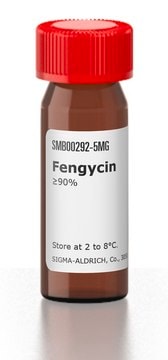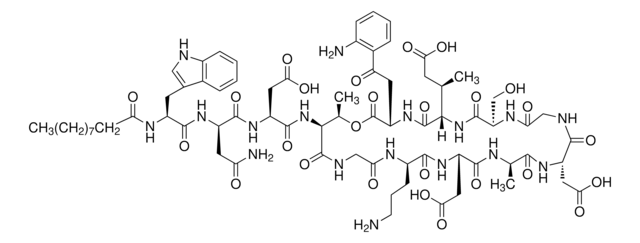S3523
Surfactin
from Bacillus subtilis, ≥98.0% (HPLC)
Synonym(s):
surfactin C
About This Item
Recommended Products
biological source
Bacillus subtilis
Quality Level
description
zwitterionic
Assay
≥98.0% (HPLC)
form
powder
storage condition
(Keep container tightly closed in a dry and well-ventilated place. Keep in a dry place.)
color
white to faint yellow
CMC
7.5-20 μmol/L (depending on methods)
solubility
ethanol: soluble 10 mg/mL
antibiotic activity spectrum
Gram-negative bacteria
Gram-positive bacteria
fungi
mycoplasma
neoplastics
viruses
Mode of action
cell membrane | interferes
storage temp.
2-8°C
SMILES string
CC(C)CCCCCCCCC[C@@H]1CC(=O)N[C@@H](CCC(O)=O)C(=O)N[C@@H](CC(C)C)C(=O)N[C@H](CC(C)C)C(=O)N[C@@H](C(C)C)C(=O)N[C@@H](CC(O)=O)C(=O)N[C@H](CC(C)C)C(=O)N[C@@H](CC(C)C)C(=O)O1
InChI
1S/C53H93N7O13/c1-30(2)20-18-16-14-13-15-17-19-21-36-28-43(61)54-37(22-23-44(62)63)47(66)55-38(24-31(3)4)48(67)57-40(26-33(7)8)51(70)60-46(35(11)12)52(71)58-41(29-45(64)65)50(69)56-39(25-32(5)6)49(68)59-42(27-34(9)10)53(72)73-36/h30-42,46H,13-29H2,1-12H3,(H,54,61)(H,55,66)(H,56,69)(H,57,67)(H,58,71)(H,59,68)(H,60,70)(H,62,63)(H,64,65)/t36-,37+,38+,39-,40-,41+,42+,46+/m1/s1
InChI key
NJGWOFRZMQRKHT-WGVNQGGSSA-N
Looking for similar products? Visit Product Comparison Guide
General description
Application
Biochem/physiol Actions
Other Notes
Storage Class Code
11 - Combustible Solids
WGK
WGK 3
Flash Point(F)
Not applicable
Flash Point(C)
Not applicable
Personal Protective Equipment
Certificates of Analysis (COA)
Search for Certificates of Analysis (COA) by entering the products Lot/Batch Number. Lot and Batch Numbers can be found on a product’s label following the words ‘Lot’ or ‘Batch’.
Already Own This Product?
Find documentation for the products that you have recently purchased in the Document Library.
Our team of scientists has experience in all areas of research including Life Science, Material Science, Chemical Synthesis, Chromatography, Analytical and many others.
Contact Technical Service






